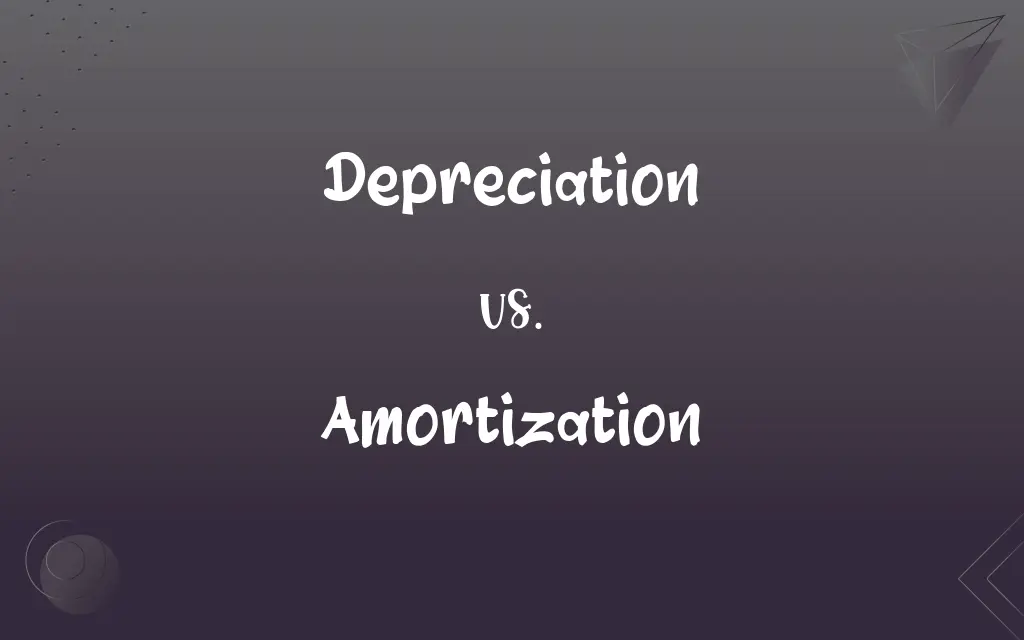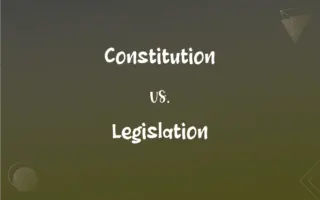Depreciation vs. Amortization: What's the Difference?
Edited by Aimie Carlson || By Janet White || Published on November 12, 2023
Depreciation pertains to tangible assets' value reduction, while Amortization refers to the gradual writing off of intangible assets or loans.

Key Differences
Depreciation and Amortization are both accounting methods that distribute an asset's cost over its useful life. However, they apply to different types of assets. Depreciation is used for tangible assets like machinery, vehicles, and buildings. These assets physically wear out over time, and Depreciation reflects this wear and tear, reducing the asset's value on the balance sheet and charging a portion of its cost to the income statement. On the other hand, Amortization applies to intangible assets like patents, trademarks, or copyrights. Since these assets don't "wear out" physically, Amortization spreads out their cost based on legal or useful life durations.
While both Depreciation and Amortization serve to allocate costs over time, their implications differ in financial reporting and tax considerations. Depreciation often employs methods like straight-line or declining balance to calculate annual charges. These methods depend on estimates of the asset's salvage value and useful life. In contrast, Amortization of intangible assets typically uses the straight-line method, with no salvage value considered. However, when Amortization refers to loans, it denotes the scheduled repayment, where periodic payments reduce both principal and interest.
Another distinction between Depreciation and Amortization lies in the rationale behind their use. Depreciation recognizes that tangible assets have a physical life and can become obsolete. Businesses must account for this reduction in value as the assets help generate revenues. Amortization, when referring to intangible assets, acknowledges that these assets might lose their competitive advantage over time, hence their value diminishes. For loans, Amortization ensures that the borrower repays the lender within a stipulated period.
Lastly, while both Depreciation and Amortization are non-cash expenses (they don't involve cash outflows), they impact financial statements and tax returns. Depreciation can affect the balance sheet and income statement, reducing the carrying amount of assets and operating income. Amortization, meanwhile, reduces the value of intangible assets or outstanding loan balances and affects the income or equity statement.
Comparison Chart
ZType of Asset
Tangible assets (e.g., machinery, buildings).
Intangible assets (e.g., patents) or loans.
ADVERTISEMENT
Purpose
Reflect wear and tear or obsolescence.
Reflect exhaustion of legal/useful life or loan repayment.
Common Methods
Straight-line, declining balance, units of production.
Straight-line for intangibles; scheduled payments for loans.
Residual Value
Often considered (salvage value).
Not considered for intangibles; loan's final payment for liabilities.
Financial Statement Impact
Reduces asset value and operating income.
Reduces intangible asset value or loan balance; affects income/equity.
Depreciation and Amortization Definitions
Depreciation
Accounting method for allocating the cost of tangible assets over their useful lives.
The company's vehicles face Depreciation over five years.
ADVERTISEMENT
Amortization
Method to recognize the consumption or repayment of certain assets or obligations.
The software license's Amortization was set at a straight-line basis over three years.
Depreciation
Value reduction of physical assets due to wear, tear, or obsolescence.
The machinery underwent Depreciation due to constant use.
Amortization
Scheduled reduction of a liability, typically a loan, over time.
Monthly mortgage payments contribute to the Amortization of the home loan.
Depreciation
Financial tool to represent the diminishing value of tangible properties.
With each year, the Depreciation of their equipment increased.
Amortization
Process of spreading out an intangible asset's cost over its useful life.
The brand's goodwill underwent Amortization over ten years.
Depreciation
A decrease or loss in value, as because of age, wear, or market conditions.
Amortization
Accounting treatment for gradually writing off specific assets or liabilities.
The patent, a key asset, faced Amortization over its legal duration.
Depreciation
(Accounting) An allowance made for a loss in value of property.
Amortization
Systematic allocation of amounts over a set period, pertaining to intangibles or debts.
The Amortization schedule detailed the periodic repayments of the business loan.
Depreciation
Reduction in the purchasing value of money.
Amortization
The act or process of amortizing.
Depreciation
An instance of disparaging or belittlement.
Amortization
The money set aside for this purpose.
Depreciation
The state of being depreciated; disparagement.
Amortization
In reckoning the yield of a bond bought at a premium, the periodic subtraction from its current yield of a proportionate share of the premium between the purchase date and the maturity date.
Depreciation
The decline in value of assets.
Amortization
The reduction of loan principal over a series of payments.
Depreciation
(accounting) The measurement of the decline in value of assets. Not to be confused with impairment, which is the measurement of the unplanned, extraordinary decline in value of assets.
Amortization
The distribution of the cost of an intangible asset, such as an intellectual property right, over the projected useful life of the asset.
Depreciation
The act of lessening, or seeking to lessen, price, value, or reputation.
Amortization
The act or right of alienating lands to a corporation, which was considered formerly as transferring them to dead hands, or in mortmain.
Depreciation
The falling of value; reduction of worth.
Amortization
The extinction of a debt, usually by means of a sinking fund; also, the money thus paid.
Depreciation
The state of being depreciated.
Amortization
The reduction of the value of an asset by prorating its cost over a period of years
Depreciation
A decrease in price or value;
Depreciation of the dollar against the yen
Amortization
Payment of an obligation in a series of installments or transfers
Depreciation
Decrease in value of an asset due to obsolescence or use
Depreciation
A communication that belittles somebody or something
Depreciation
Systematic allocation of an asset's expense over its operational life.
Technological changes caused rapid Depreciation of the firm's hardware.
Depreciation
Periodic reduction in the book value of a tangible asset.
The annual report reflected the Depreciation of office infrastructure.
FAQs
What assets typically undergo Depreciation?
Tangible assets like machinery, vehicles, and buildings.
Can land be depreciated?
No, land doesn't depreciate as it doesn't wear out over time.
What's the primary purpose of Amortization for intangible assets?
To spread out their cost over their legal or useful life.
How is Depreciation calculated for tax purposes?
Using methods like MACRS, set by tax regulations.
Can an intangible asset have an indefinite life, avoiding Amortization?
Yes, assets like goodwill might have indefinite lives and aren't amortized.
Is Amortization applicable to tangible assets?
No, Amortization is for intangible assets or specific financial liabilities.
Why is Amortization important for intangible assets?
It acknowledges their value diminishes over legal or economic life.
Does Depreciation represent a cash outflow?
No, it's a non-cash expense reflecting asset value reduction.
What happens when a loan is fully amortized?
The borrower has repaid the loan in full, including principal and interest.
Does Amortization always imply equal payments for loans?
Typically, yes, but the split between principal and interest may vary.
What factors influence the rate of Depreciation?
Asset's useful life, salvage value, and chosen accounting method.
How does Amortization affect a company's balance sheet?
It reduces the value of intangible assets or outstanding loan balances.
Can Depreciation methods differ within industries?
Yes, based on asset use, industry standards, and tax regulations.
How does accelerated Depreciation differ from straight-line?
It charges higher expenses in initial years, decreasing over time.
What are common intangible assets that undergo Amortization?
Patents, copyrights, trademarks, and customer lists, among others.
What's the effect of Depreciation on profitability?
It reduces the reported operating income.
How does Amortization differ when referring to loans vs. intangibles?
For loans, it's scheduled repayment; for intangibles, it's cost allocation over useful life.
Is Amortization always a straight-line method for intangibles?
Most commonly, but methods can vary based on predictable usage patterns.
Why is Depreciation essential for businesses?
It matches the cost of assets with revenues they generate over time.
Can Depreciation methods change over an asset's life?
Yes, if justified by changed circumstances, but with tax and reporting implications.
About Author
Written by
Janet WhiteJanet White has been an esteemed writer and blogger for Difference Wiki. Holding a Master's degree in Science and Medical Journalism from the prestigious Boston University, she has consistently demonstrated her expertise and passion for her field. When she's not immersed in her work, Janet relishes her time exercising, delving into a good book, and cherishing moments with friends and family.
Edited by
Aimie CarlsonAimie Carlson, holding a master's degree in English literature, is a fervent English language enthusiast. She lends her writing talents to Difference Wiki, a prominent website that specializes in comparisons, offering readers insightful analyses that both captivate and inform.








































































